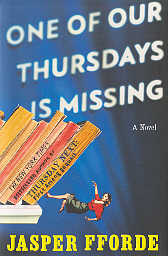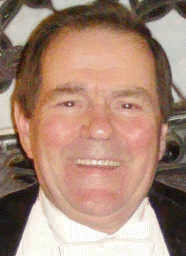At least within a novel, even the letter on the desk mentioned in first chapter turns out to be meaningful in the
last chapter. But in real life the letter on my desk will just sit there until someday we're having company and Del asks
me to clean up the clutter on my desk when said letter will be simply discarded. Much of our RealWorld experiences
seem to have no meaning(3). Or are we living in a big book in an even larger Library?
[page 41, 42] "I'm sure it's not all hot buttered crumpets out there in the breathing world
of asphalt and heartbeats," I said by way of balance.
"Oh, I agree," replied the red-haired gentleman, who had, I noticed, nut-brown
hands with fingers that were folded tight along the knuckle. "For all its boundless color,
depth, boldness, passion and humor, the RealWorld doesn't appear to have any clearly
discernible function."
"Not that better minds than ours haven't tried to find one."
The jury had been out on this matter for some time. Some felt that the RealWorld
was there only to give life to us, while others insisted that it did have a function, to which
no one was yet party. There was a small group who suggested that the RealWorld was not
real at all and was just another book in an even bigger library. Not to be outdone, the
nihilists over in Philosophy insisted that reality was as utterly meaningless as it appeared.
Suddenly we have the long-awaited eponymous-dropping! When Thursday asks him, "Why are you telling me
this?" The red-haired guy answers, "I don't have much time. I think they saw us talking. Heed this and heed it well:
One of our Thursdays is missing!" Now that the book title has been duly established, the plot can move one
inexorably to the denouement.
Suddenly a Man in Plaid appears. Well, actually he was insulted to be said to be wearing plaid, he said, "It's
not plaid. It's tartan." With that, we are expected to identify the Men in Plaid appropriately as some BookWorld
wide enforcement agency. Nowhere does Fforde mention if their clothes were made from a yard of plaid or where
the plaid material was designed.
Suddenly we run directly into the three-funny-things in one sentence pattern again:
[page 45] I took a left turn at the Lone Gunman pub, and walked past a hangar full of
advanced flying machines that all displayed a swastika, then entered a shantytown that was
home to theories that lived right on the edge of Conspiracy due to a sense of overtired
outrageousness.
Oh, and let me introduce you to Thursday's domestic robot whose primary training is in mixing and serving
cocktails and whose motive force is a wind-up spring. Sprockett's emotions are displayed on his stolid metal face
by a fanned array of settings and a needle pointer over his eyebrow indicates which emotion he should be displaying.
His eyebrow pointer may indicate an emotion but that doesn't mean that he does "truly understand what emotion
or feel actually means." Thursday asks him if he felt danger from the imminent stoning she rescued him from.
[page 52] "But surely you felt danger when you were about to be stoned and relief when
rescued?"
"Yes, but only in the context that to be destroyed would deny me the opportunity
to serve cocktails — and that would contravene the second law of domestic robots."
Even when giving descriptions, Fforde can be funny. Take the short paragraphs from Bradshaw's BookWorld
Companion which grace the beginning of each chapter. Here's an example from "6. The Bed-Sitting Room"
describing what happens when thieves steal and trade sections of out-of-print books.
[page 56] Entire books were stripped of all nouns, and in the very worst cases large
sections of dramatic irony were hacked from the books and boiled down to extract the raw
metaphor, rendering once-fine novels mere husks suitable only for scrapping.
To my mind with its delicate sense of paradox, the concept of "raw metaphor" seems to be a rather refined
metaphor.
Have you ever read a book before it was made into a movie? You know what happens: you develop your own
image of how the main characters look and then suddenly it's made into a movie and Rhett Butler turns into Clark
Gable forever in "Gone with the Wind." The most recent character in fiction this has happened to is Harry Potter.
[page 69] Harry Potter was seriously pissed off that he'd have to spend the rest of his life
looking like Daniel Radcliffe.
What is so droll about this comment is that usually we think of the actors like Radcliffe who can't get jobs after
doing some Potter because he has become so identified with Harry Potter. Fforde forces us to consider the feelings
of the fictional characters in his all-too-real BookWorld.
When Thursday introduces Sprockett to her old pal Bowden, she tells him the story which spirals down into
farce.
[page 81, 82] "I didn't know you needed a butler," said Bowden.
"Everyone needs a butler. He was going to be stoned, so I took him with me."
"What do cog-based life-forms get stoned with?" asked Bowden in an impertinent
manner. "Vegetable oil?"
"Actually, sire," intoned Sprockett, "it's sewing machine lubricant for a mild tipple.
Many fee that the exuberant effects of 3-in-One are worth pursuing, although I have never
partaken myself. For those that hit have rock bottom, where life has become nothing more
than a semi-conscious slide from one partial winding to the next, it's WD-40."
Nothing is more troublesome than orphaned prefixless positives. Thursday chose to release some of these that
the Lady of Shalott had given her — it seems the Lady has soft spot for these words, What are these words, you
ask? Fforde gives them to you in three sentences. These words are like speed bumps or deep potholes, so be ready
for them:
[page 84] I let the defatigable scamps out of their box. They were kempt and sheveled but
their behavior was peccable if not mildly gruntled. They started acting petuously and ran
around in circles in a very toward manner.
The two terrorists of this novel are Speedy Muffler and Racy Novel. They are planned to explode a dirty bomb
and create havoc in BookWorld. How might they do this?
[page 86] When Muffler claimed to possess a dirty bomb capable of hurling scenes of a
gratuitously sexual nature far into Women's Fiction, the BookWorld finally took notice and
the peace talks were set. Thursday Next would be the chief negotiator, and she had good
form When Scandinavian Detectives threatened to cede from Crime, it was she who
brought them back.
The problem is the real Thursday is missing and might be dead, so our hero, the written Thursday Next, is the
only one who can save BookWorld from the dastardly plan of Muffler and Novel. And the Men in Plaid are dogging
her every move, even trying to run her off the road and kill her. Perhaps Men in Plaid will remind you a bit of Men
in Black, the famous alien hunters in the movie of that title. Our Thursday's adventures have the same tone of
laughter-producing seriousness as the Men in Black series of movies. Their staid demeanor led Thursday to opine,
"They probably didn't do well at singles bars but would doubtless be able to play poker at tournament level." (Page
89)
Alfred Hitchcock explained once about how the item which everyone is searching for in a movie, especially his
movies, is known in the business as the McGuffin. Not surprising that Thursday reveals that Book Data Recorders
were made by James McGuffin Co in the Suspense genre, "so they have a tendency to go missing until dramatically
being found right at the end of an investigation." (Page 91)
When a dodo (Pickwick) and a cog-based windup life-form (Sprockett) have a discussion, one might want to
say, "Horror! Horror! Horror!" as they discovered the intense use of epizeuxis in the whispering emanating from
the damaged Triumph motorcycle, leading them to think that the book which contained the Triumph had been
destroyed by a rhetorical worm whose specialty was the rhetorical device of word repetition for fun and profit called
epizeuxis. I can just now hear Gomer Pyle saying, "Golly, golly, golly!"
[page 95]
The works that built the cycle worked;
The cycle's labor labored on
And workers sought and workers bought
The managers out and managed 'owt
Until the cycle's cycle cycled round.
But markets moved and markets shifted,
To Eastern trade that Eastern made.
Loans were pleaded, loans were needed,
The workers' workers worked their last.
But ruin didn't do as ruin does,
For Triumph's collapse led to Triumph's triumph.
The motto during the McCarthy Era was "Better Dead and Red" and the motto shared at the head of Chapter
11 is "Better Dead than Unread". (Page 100)
Fforde's biting satire takes on Coffeeshops with their expensive coffee! That people go to a coffeeshop for
something other than coffee was demonstrated to me as I walked into PJ's Coffeeshop one day. As I walked past
four ladies who looked as if they had been hard at work for hours, sitting around a table filled with notebooks and
strewn papers, I heard one of them say, "Let's take a break!" Since coffeeshops are normally used for people to
take a break, I was intrigued to know if they were going to go to a different coffeeshop for their break, or merely
go buy another coffee. Thus, said, it would be cheaper for such hard workers if they could not order a coffee as
Thursday does at Stubbs.
This next passage takes place after she failed to keep a date Whitby. She called him to apologize and suggested
a place whose name suggested ample room for their lunch meeting. Whitby is the opposite of a McGuffin, everyone
knows who he is and he keeps turning up at inconvenient times during the story instead of once at the end.
[page 101] I told him I would definitely be free for lunch, suggested the expensive and
needlessly spacious Elbow Rooms, then pretended that Pickwick had broken something,
so I could end the conversation.
I drew a deep breath, cursed myself for being so stupid, took a pager with me and
walked down the road to Stubbs, the outrageously expensive coffee shop on the corner.
"Could I not have a coffee?" I said, meaning I wanted an empty cup. Stubbs had
become so expensive that no one could afford the coffee, but since the ambience in the
café was so good and the establishment so fashionable, it was always full.
"What would you not like?" asked Paul, who wore a black gown and a wig due to
a syntactical head cold that made him unable to differentiate himself between a barista and
a barrister.
"Better not give me a latte," I replied, "and better not make it a large one."
The land area on Fiction Island reserved for Comedy was threatened by the imminent war between Women's
Fiction and Racy Novel, as Acheron warned Thursday, "I don't think [Comedy] was joking when they said they
would defend their land to the last giggle." (Page 102) To a Comedian laughing is no joke; it's an art form. A
character named Lockheed warns Thursday, "You can expect a few more incidents heading your way with this kind
of flagrant level of inspired disinterest."
Here is a complete passage from the Bradshaw book that made me laugh out loud. U-238 is the most common
isotope of Uranium. All I can think to say after reading the passage below is: "Are U-238 Sirius?"
[page 125] Distilling metaphor out of raw euphemism was wasteful and expensive, and the
euphemism-producing genres on the island were always squeezing the market. Besides,
the by-product of metaphor using the Cracked Euphemism Process liberates irony-238 and
dangerous quantities of alliteration, which are associated with downright dangerous
disposal difficulties.
Bradshaw's BookWorld Companion (9th edition)
Things get rather dicey for Thursday as she and Sprockett drive through a Mime Field, but they don't attack
unless set off. How do you set off a Mime, you ask? Similar to the way you might set off a poet at a poetry reading.
"By sighing during a performance, looking away, rolling your eyes — that sort of thing. Mimes hate being ignored
or having their performance interrupted. In that respect they're almost as touchy as poets." (Page 138)
Our hero, the written Thursday, is given away, even though she has the real Thursday's official badge, because
she doesn't know Jack Schitt! Had to happen as the wonderful ambiguity guy from the first book appears and
Thursday doesn't recognize him. She knew him only by reputation whereas the real Thursday would have recognized
him. (Page 224)
Thursday meets Tuesday, her cousin, who inherited the genius of Uncle Mycroft the inventor. Tuesday's latest
project reminded me of a poster that I mounted prominently on the wall at the foot of the stairs that our youngest
teenager son came down each day. It set suitably bold print: HIRE A TEENAGER WHILE HE STILL KNOWS
EVERYTHING ! ! ! She explains it to Thursday:
[page 234] She spoke to me of her latest project: a plausible method to crack one of the
most intractable problems in modern physics, that of attempting to instill a sense of
urgency in teenagers.
After returning from a trip to RealWorld, our written Thursday Next is beginning to feel as if she might be real.
She asks Bradshaw to her, and his test is immediate and easy to do. He simply places his finger on Thursday's nose
and asks her what he did. She has no clue, but any real person would immediately know, even a blind person.
[page 420] "But could I tell if I were real? Could anyone tell?"
"There are lots of signs," said Bradshaw, "but here's the easiest: What am I doing now?"
"I don't know."
"How about now?"
"As far as I can tell, you're not doing anything at all."
Bradshaw took his finger off my nose and smiled. "I suppressed my action line. The
real Thursday could have seen what I was doing, but you had to rely on the description.
You're fictional, my dear, through and through."
Finally the written Thursday gets a clue as to the presence of a live Thursday when she uncovers the name
Tuesday Laste on the passenger list of Mediocre Gatsby's TransGenre Taxicab. But she encounters some deep
epizeuxis in this conversation with Sprockett about Commander Herring, known by all as Red.
[page 282] "What about Red Herring, ma'am?"
"I'm not sure. Is Red Herring a red herring? Or is it the fact that we're meant to
think Red Herring is a red herring that is actually the red herring?"
"Or perhaps the fact you're meant to think Red Herring isn't a red herring is what
makes Red Herring a red herring after all."
"We're talking about serious metaherrings here. Oh, crap, I'm lost again. Who's
talking now?"
We're nearing the end of the book and this review. If you have enjoyed neither, then all I can say is, "Why don't
you go do a Plot 9 on yourself?" Yes, you will have to read the book to find out what it means, but I assure you if
that's the case, you will understand completely how appropriate the expression is. (See page 286 reference, which
will only tantalize you.) Perhaps two ladies of negotiable affection will arrive in time to rescue you. I can only leave
you with a some pseudo-erudition which the written Thursday Next picked up in HumDram: "You're kind," I
replied, "but last Thursday and next Thursday are still a week apart." (Page 302) If you have any questions of me,
you can leave me a message on the shortwave colophone which I monitor continuously when I'm not busy thinking.
(Page 322)
I must close this immediately as I feel a Emergency Snooze Protocol 7B being initiated. May
you be forever safe from the antikern and from Owlcreeking(4).





